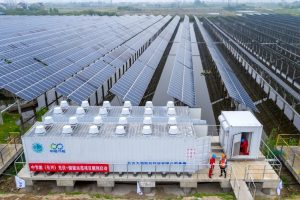The US and China have agreed to expand contact between their military commanders during three days of talks that US National Security Adviser Jake Sullivan had with top officials in Beijing this week.
Sullivan met with Chinese President Xi Jinping on Thursday after previously holding talks with Foreign Minister Wang Yi and military adviser Zhang Youxia on topics aimed at easing tensions between the two powers ahead of the US election.
As the pair sat down in the Great Hall of the People, Xi told Sullivan Beijing was committed to a stable relationship with Washington.
ALSO SEE: Beijing Fumes as Canada Slaps 100% Tariffs on China-Made EVs
“In this changing and turbulent world, countries need solidarity and coordination … not exclusion or regress,” Xi said.
Sullivan told Xi US President Biden was committed to managing the relationship to avoid conflict and “looks forward to engaging with you in coming weeks”.
This week’s discussions covered a range of issues complicating ties between the countries – tensions over Taiwan, the South China Sea, Russia, and US demands for more Chinese help to stem the flow of the ingredients for fentanyl, the leading cause of drug overdoses in the United States.
Calming choppy seas
Before meeting Xi, Sullivan had a rare meeting with a general considered by diplomats to be the president’s key military adviser, Zhang Youxia, vice chairman of the Central Military Commission. He also had extensive discussions with China’s top diplomat, Wang Yi, on Tuesday and Wednesday.
With Zhang, Sullivan pushed for enhanced working-level communications between the countries’ militaries during what was the first meeting between Zhang and a Biden administration official.
Before Sullivan and Zhang sat down for talks, the Chinese general said America’s request for the meeting showed “the value the US government puts on military security and our military-to-military relationship.”
Sullivan said after: “I know it is rare that we have the opportunity to have this kind of exchange, and given the state of the world and the need for us to responsibly manage US-China relations, I think it’s a very important meeting.”
Both referred to progress in military communications and arrangements for theatre-level commanders to speak soon by telephone, which the United States has pushed for amid increased regional deployments.
The White House said Sullivan also emphasised the need for stability across the Taiwan Strait and freedom of navigation in the disputed South China Sea, a vital trade waterway, and raised concerns about China’s support for Russia’s defence industrial base.
Zhang is believed to be close to Xi and has survived turmoil in China’s military ranks. Western and Asian diplomats say he is more powerful than the defence minister, who more frequently meets foreign officials.
In Wednesday’s meeting, Wang and Sullivan discussed the prospect of fresh talks soon between Biden and Xi and shared contrasting perspectives on the conflicts in the Middle East and Ukraine, Chinese territorial claims from Taiwan to the South China Sea, and trade.
Areas of cooperation to continue
The two sides agreed to hold a second round of talks on ways to limit the risks of artificial intelligence (AI), as well as maintaining high-level exchanges and cooperation on drug control, law enforcement, climate change and the repatriation of illegal immigrants, according to official statements.
“The key to the smooth development of China-US interaction lies in treating each other as equals,” Wang told Sullivan, according to state broadcaster CCTV.
The White House said the two held “candid, substantive, and constructive discussions”.
In the final months of his presidency ahead of the November 5 election, Biden has pushed direct diplomacy to influence Xi and keep tensions at bay. US Vice President Kamala Harris, the Democratic candidate, would probably pursue a similar strategy.
However, many analysts aligned with former President and current Republican candidate Donald Trump see that approach as too soft in the face of China’s increasingly assertive foreign policy.
- Reuters with additional editing by Jim Pollard
NOTE: Minor changes were made to the text and headline on this report on August 29, 2024.
ALSO SEE:
China Damns Latest US Ban on 42 Firms Tied to Russian War
China’s Critical Minerals Blockade Risks Global Chip Shortage
China to Curb Exports of Antimony Metals, Ores, Oxides – SCMP
US Tech Firms Face ‘Death Spiral’ From New China Curbs: Lawmakers
Chinese Firms Seen Shifting Production Abroad to Avoid US Tariffs
US Revoked Eight Licences For Exports to China’s Huawei in 2024
China Bans Government Computers From Using Intel, AMD Chips: FT
China’s Retaliatory Bans Could Cost US Tech Giants Billions






















